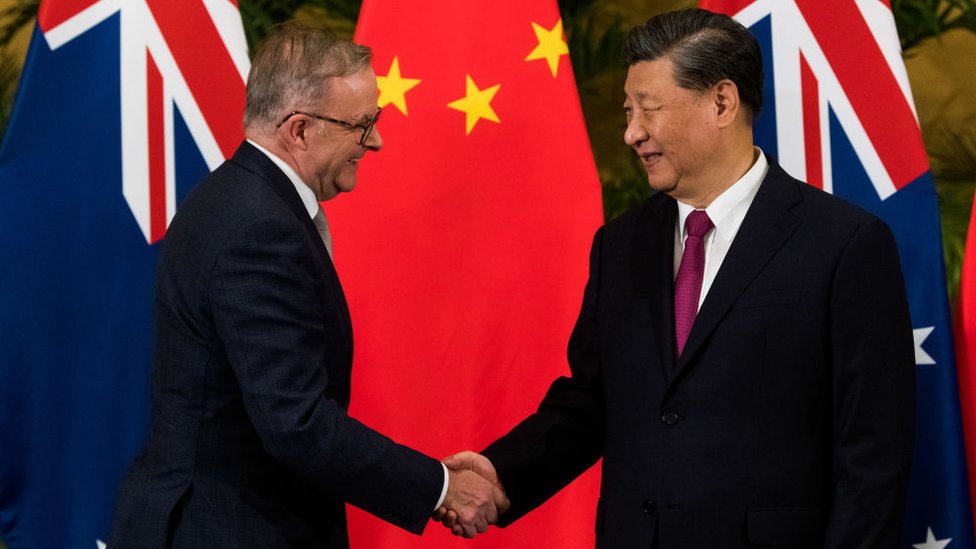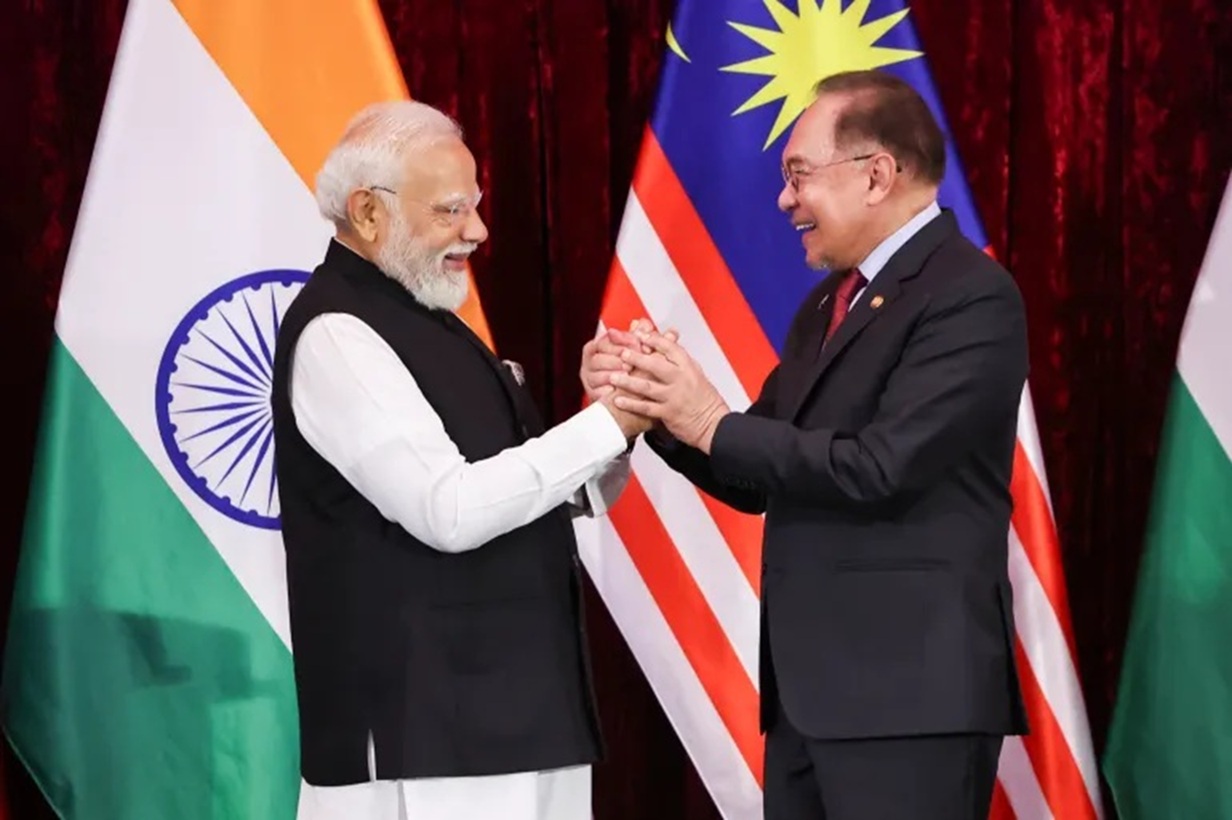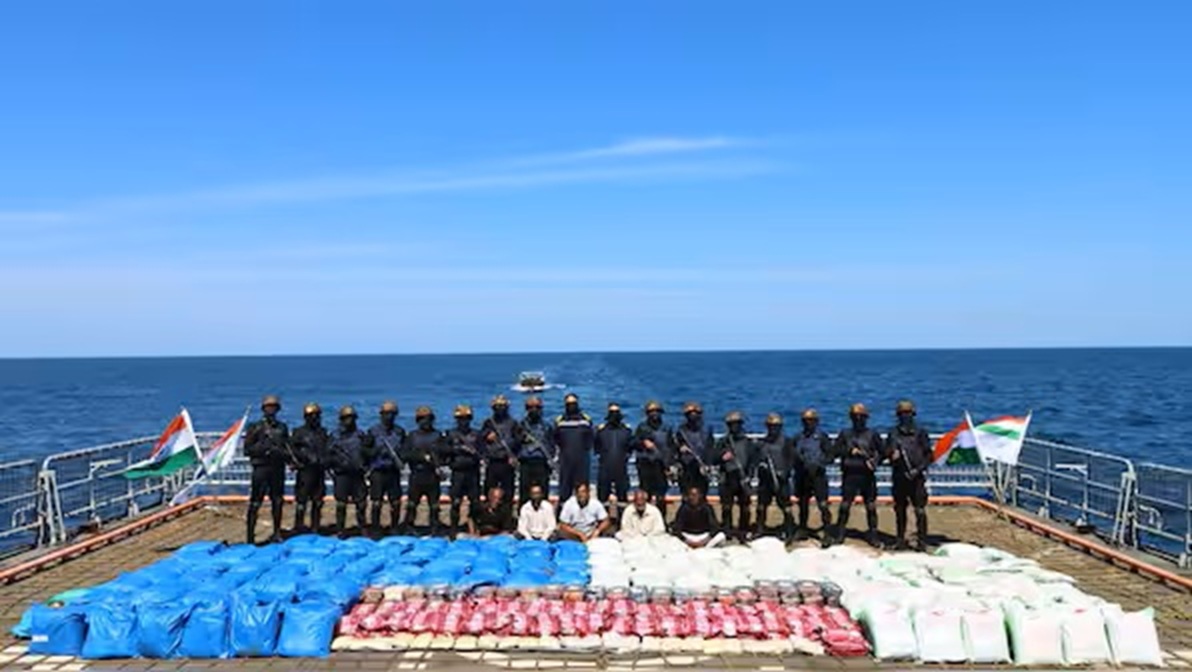The bilateral relationship between Australia and China is based on strong economic and trade complementarities and longstanding community and cultural links. Australia’s reconciliation efforts post Covid 19 resulted in a significant transformation in the year 2023
Last year From 4th to 7th November 2023, Anthony Albanese became the first Australian Prime Minister to visit China in seven years after their bilateral relations dived to historic lows in the past years due to differences on issues of trade, security, human rights, etc. This visit was seen as a sort of reconciliation tour from the Australian side after facing tensions in their bilateral relations with China. Earlier China which was a large export market for Australia had imposed harsh import restrictions on beef, coal, etc. from Australia as relations dived between these two nations. Australian wine was also slapped with record tariffs as high as 212.1 percent in 2020 to punish Australia after it supported calls for a probe into the origin of the COVID-19 pandemic.
China had even claimed that Australia, along with its ally the US was trying to interfere in China’s internal matters as Australia was also raising issues on matters of Human rights in Tibet, Xinjiang, and Hong Kong, Chinese aggression against Taiwan, Chinese claims in the South China Sea (SCS), etc. Australia wants a free and open Indo-Pacific along with other Quad members which is being challenged by China regularly. After a long period of tensions, Australia decided to hold talks with China, seeing how the US also maintains communication with the Chinese despite tense relations. Therefore, it’s important to understand whether this tour can lower the Chinese-Australian tensions significantly or just act as a pseudo-ice-breaker with no future scope of a major change in the status quo in their relations.
Understanding the Joint Statement of Leaders
As per the Joint statement of this meeting, PM Albanese and President Xi reaffirmed their support for the Comprehensive Strategic Partnership and reiterated the importance of a stable, constructive bilateral relationship. Both sides agreed to develop relations on key aspects of political dialogue, trade, climate change, people-to-people connections, and multi-entry visa requirements for business. Australia also reiterated its commitment towards the one-China policy which can be a tricky affair in the future as China and the West have often locked horns over matters of human rights in Tibet, Xinjiang, or Chinese aggression across the Taiwan straits.
Also notably, the security aspect is missing from the above statement which is surprising since Australia has suffered aggression from the PLAN and PLAAF in various theatres, especially in the SCS region in recent years. Now Australia is a key member of the Quad grouping. The Quad essentially aims to sustain a free and open Indo-Pacific. If Australia doesn’t discuss matters of security with China, especially its security, it can be seen as a sign of weakness for the Quad. The message sent across the global community will be that when one Quad member can’t speak for its security, how can the Quad speak for the security of the entire Indo-Pacific? Unlike Australia, the US and Japan have been vocal in their protests against Chinese behavior in the wider Pacific region. As the Australian leadership failed to discuss security concerns which was needed more than the other aspects, here it can be safely understood that Australia for this occasion wanted to safeguard its economic interests, rather than the Quad’s interests.
Analysis of the Strategic Takeaways from the Meet
If we analyze the strategic takeaways from the above meeting, then China has an upper edge. Both nations agreed on political dialogue, but will China be interested in having a dialogue with Australia on matters of consular access of its citizens or human rights issues? We observe contradictions in the case of Writer Yang Hengjun who was sentenced for espionage charges in 2019 and has received a suspended death sentence from a Chinese court behind closed door trial. Although another Australian journalist Cheng Lei was released from jail in China, Coalition MP Scott Morrison, who was the PM when Ms Cheng was first detained, acknowledged that PM Albanese has not spoken about it in those terms with regards to Yang Hengjun.
In trade, Australia can expect some relief in terms of withdrawal of restrictions for its exports, but China can extract a reciprocal treatment from Australia to let China join the Comprehensive and Progressive Agreement for Trans-Pacific Partnership (CPTPP) — a trade agreement involving Australia, Canada, Japan, and others. In this, if Australia can think to allow China to join due to its softening stance on its key exports, other partners like Canada and Japan may not be too willing because they may still be very hawkish on China, and being the key allies of the USA can show their opposition. Hence overall this aspect also puts the burden on Australia which will need to be evaluated in the future.
In the area of climate change, although both sides agree to recommence dialogue, they can have disagreements on Australia’s agreement with Pacific Island nations like the ‘Australia – Tuvalu Falepili Union Treaty’ which aims for climate cooperation and cooperation for security and stability. Under this Australia shall assist Tuvalu in response to major natural disasters, public health emergencies of international concern, and military aggression against Tuvalu. But the rider is Australia must approve any security or defense deal that Tuvalu may sign with any other country. Here the last clause is widely seen as an effort to lock out China and hence may not be taken well by the Chinese. Already the Tuvalu general elections are happening and the recent trends show that the Tuvalu lawmakers have chosen Feleti Teo as the tiny South Pacific Island nation’s Prime Minister, after former PM Kausea Natano, who opposed Chinese policies and was pro-Taiwan lost the elections. It’s still unclear how the new government would like to have relations with China, Taiwan, or Australia.
Moving forward, on the aspect of people-to-people connection, the Chinese will be looking to have exchanges in sectors like academia, innovation, education, and aviation. One would think these areas of cooperation are normal in any state-to-state bilateral relations. But not in the case of China. Sectors like innovation and academia are where the Chinese would cultivate their spy network for espionage and IP theft. Already the Five-Eyes intelligence chiefs have warned of the Chinese government’s role in the theft of innovation, along with economic espionage. In October 2023, a Chinese national, who was a visiting professor, and a genuine academic was removed from Australia after a foiled attempt to infiltrate a prestigious research institution in Australia. Therefore, advancing people-to-people ties can serve the interests of China in one way only.
In the aviation sector, does Australia like to have exchanges with China despite being aware that in 2022, China was found to be luring former Royal Australian Air Force pilots with lucrative payments to pass on their experience to the Chinese military? As per reports, the pilots that were lured by China were recruited from a South African Flying school, which had a partnership with the Aviation Industry Corporation of China (AVIC). As per reports, these pilots knew F-35A stealth fighters and aircraft carriers. So, if China gains an opportunity to have people-to-people exchanges in aviation, it can gain access to sensitive US military platform information, thereby undermining US military superiority.
Finally, this Reconciliation tour remained silent on the security concerns of Australia. In Australia’s backyard Solomon Islands, China is expanding its influence by sending its police forces to the upcoming Pacific Games. In the SCS, an Australian Air Force P-8 maritime surveillance aircraft was intercepted by a Chinese J-16 fighter aircraft in 2022. A Chinese destroyer CNS Ningbo injured Australian navy divers with sonar pulses in Japanese waters last year in 2023 immediately after the PM Albanese tour. The Australian PM is very well aware of these aggressive acts of China in the SCS and Indo-Pacific and will find it difficult to progress if the security interests of Australia are compromised in the future.
Conclusion
To summarize, Australia’s reconciliation effort and tour undertaken come with no special strategic benefit for Australia shortly apart from the trade aspect. The Chinese are well aware of Australia’s role in the Quad and AUKUS and may not want to soften its approach too soon. It has to be seen how this reconciliation tour will be seen by the Australian allies and partners like the US, New Zealand, or Britain. For the moment, it seems Australian PM Albanese would like to take charge and improve the domestic economic conditions and take care of the electorate, mainly the farmers and other industries who form a core voter for him. The political opposition can smell a chance to oppose this policy if Australia faces another security threat in the future. Therefore, overall, it can be predicted that this reconciliation effort risks expanding China’s strategic opportunities in the Indo-Pacific.
Title image courtesy: BBC
Disclaimer: The views and opinions expressed by the author do not necessarily reflect the views of the Government of India and Defence Research and Studies





